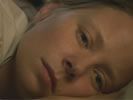Eye For Film >> Movies >> Saraband (2003) Film Review
To art film lovers of a certain age, Ingmar Bergman will always be a kind of god. Since 1946, he's been doggedly making his own brand of film (62 so far) and at his best (Hour Of The Wolf, Cries And Whispers) has explored the human condition more fearlessly and more thoroughly than any other director. But his stalwart, nurturing women and cold, withholding men, endlessly locked in co-dependent verbal ping-pong, are a masochistic pleasure few of today's young filmgoers will be inclined to seek out.
Which is a pity, because no one understands emotional agony quite like Bergman. Having said that, Saraband, which the director has stated will be his final film, should not be anyone's introduction to his work. Shot for Swedish television in 2003, when Bergman was 85, it is a sequel of sorts to 1973's Scenes From A Marriage (also made for television and only recently released on DVD), which ferociously laid bare the 16-year-old marriage of Johan (Erland Josephson) and Marianne Liv Ullmann), a couple driven to divorce by lies and adultery (his) and unwarranted devotion (hers). Now, after 30 years, Marianne has an inexplicable yen to see her 81-year-old ex and tracks him down at his summerhouse in the mountains. There, Bergman stages the kind of family drama any Jerry Springer fan will immediately recognize, albeit it with more modest clothing and more accurate grammar.

A sarabande is a two-person dance, popular in the 17th and 18th centuries, and Bergman structures his film around 10 two-person conversations which gradually move closer and closer to the characters - sometimes closer than we would like. Although the action is framed by Marianne and Johan's reunion, the drama is centered on a second couple, Henrik (Borje Ahlstedt), Johan's 61-year-old musician son from an earlier marriage, and Henrik's 19-year-old daughter, Karin (Julia Dufvenius). The pair live in Johan's guest cottage, where the recently fired Henrik oversees his daughter's cello lessons and pretty much controls her life. Bizarrely, he also shares her bed, though Bergman is vague about their level of dysfunction. What isn't vague is Henrik's grief over his dead wife, Anna, whose photograph haunts the film (and probably its director, whose late wife, Ingrid, is the woman in the frame).
Humiliation flows downhill. Johan detests his son's ineffectuality, spewing contempt when Henrik requests a loan. Henrik later attacks Marianne in a church, displaying his father's innate cruelty, before shoveling more guilt upon the luckless Karin. Everyone, including the director, is looking backward, and the actors work like dogs to please him. But the familiar scenarios have a stilted theatricality, accentuated by the high-definition video used to film them; the Scandinavian light never looked so fake.
The joy of Saraband is watching Ullmann and Josephson fall into the groove of characters who are second nature to them. When Marianne confesses to Johan how traumatic their divorce was for her, he casually replies, "Not for me." If this were an American film, Johan would Learn and Grow (or die); if it were French, he'd be popping Viagra and chasing Karin's friends. But in Sweden, Johan is still a selfish, heartless bastard, Marianne is still beatific and Bergman is still Bergman. All's right with the world.
Reviewed on: 13 Aug 2005




















